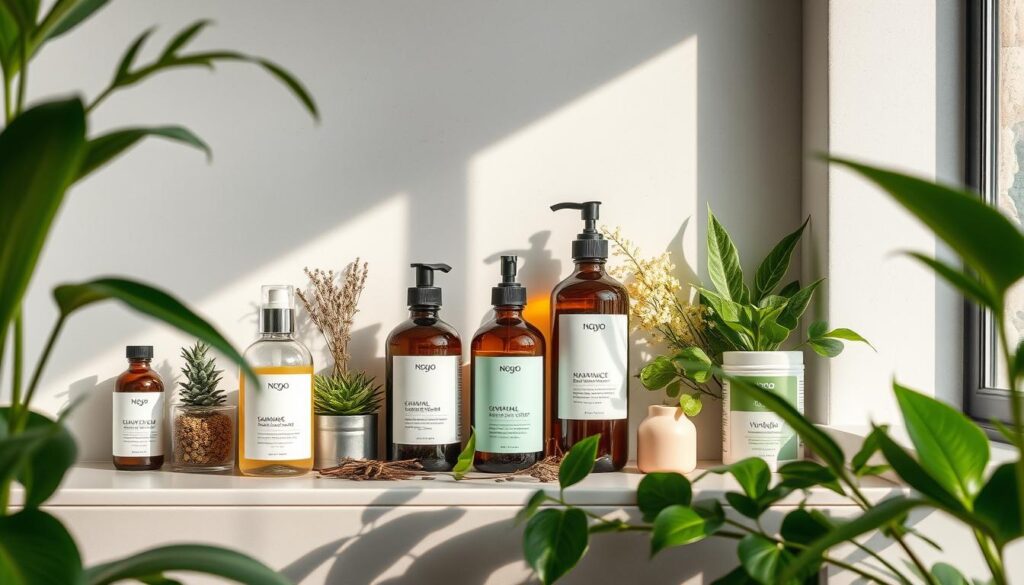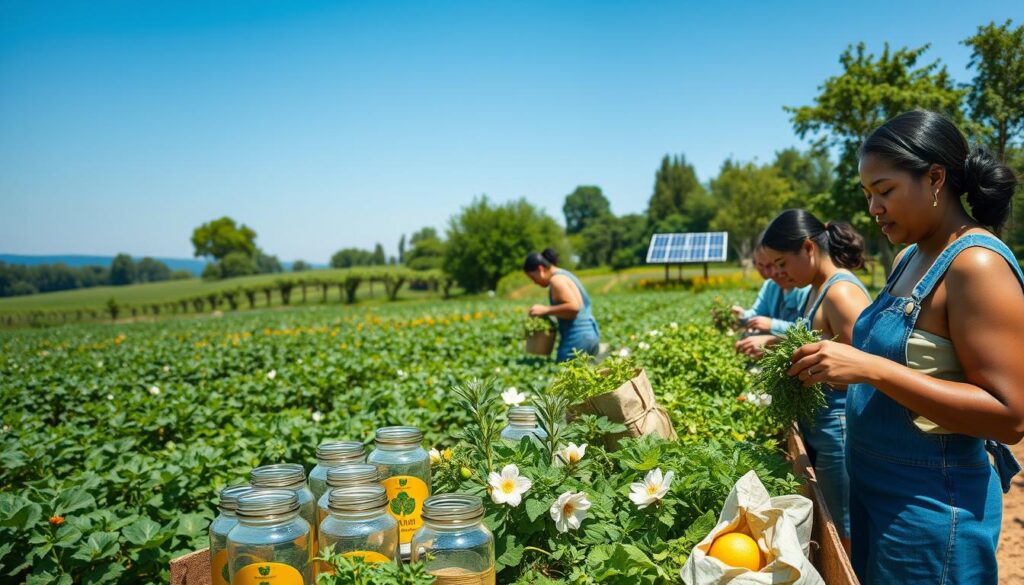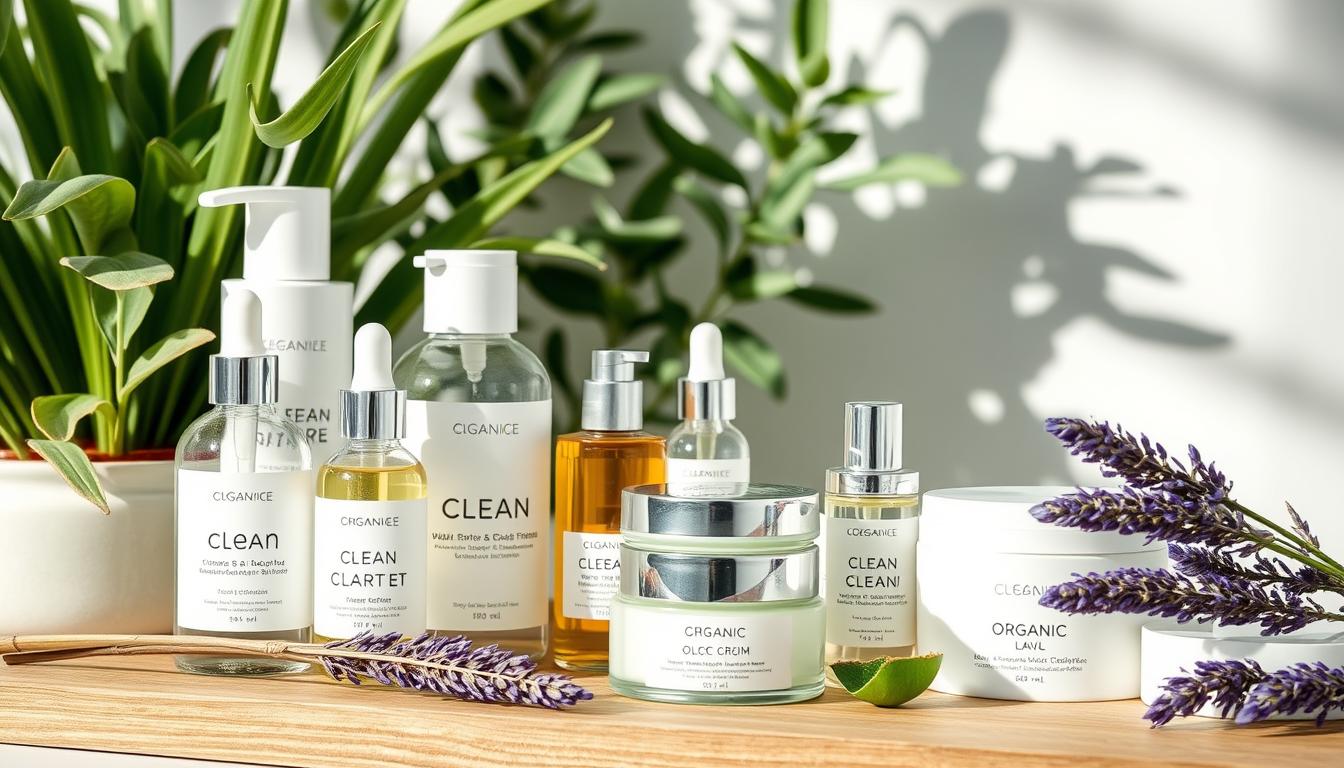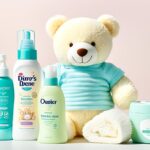Clean beauty trends. As I look around my vanity, I see a big change in beauty products. We used to accept what conventional cosmetics offered without question. Now, many of us, like me, want more from our beauty products.
The clean beauty movement is all about being open, safe, and green. These products use natural and safe ingredients. They offer a new choice for those who care about what they put on their skin.
Key Takeaways
- The beauty industry is moving towards clean beauty, thanks to more aware consumers.
- Clean beauty products use natural and organic ingredients, meeting consumer demand for safety.
- Old beauty products can have harmful chemicals like parabens and synthetic fragrances. Clean beauty is a safer choice.
- Clean beauty products aim to improve skin health and offer lasting benefits.
- The clean beauty movement is changing the industry, driven by a desire for openness and sustainability.
Understanding the Clean Beauty Movement
The clean beauty movement is growing fast. More people want to know what’s in their beauty products. Clean beauty stands out because it uses natural, eco-friendly ingredients.
What Defines Clean Beauty Products
Clean beauty products avoid harmful chemicals like sulfates and synthetic fragrances. They are made with natural, non-toxic ingredients. Brands also focus on being transparent and cruelty-free.
The Evolution of Natural Skincare
Natural skincare has evolved thanks to the clean beauty movement. People are looking for safer, sustainable options. This has led to new products that are effective and natural.
Consumer Awareness and Demands
More people want clean beauty products. The Natural Marketing Institute found 24% of U.S. adults prefer them. This shows how big the trend is. Consumers are checking ingredient lists for natural and cruelty-free products.
| Statistic | Value |
|---|---|
| Gluten-free products in the clean beauty sector have seen a 26% growth. | 26% |
| Organic products in the clean beauty market have surged by 93%. | 93% |
| Plastic-free searches in beauty have risen by a remarkable 897%. | 897% |
| 58% of Americans prioritize natural ingredients in skincare. | 58% |
| The global clean beauty market is projected to reach $22 billion by 2024. | $22 billion |
The clean beauty movement has changed the beauty industry. It has made consumers want safer, sustainable products. This trend will keep shaping how we view personal care and cosmetics.
Natural and Non-Toxic Ingredients in Modern Cosmetics
The clean beauty industry is booming, thanks to a growing demand for natural ingredients and organic beauty products. People are worried about the health risks of synthetic chemicals, parabens, and sulfates in traditional beauty items. So, modern cosmetics are now using botanical extracts, essential oils, and plant-based ingredients. This meets the need for clean and sustainable beauty options.
Recent data shows the global clean beauty market could hit $22 billion by 2028, growing at 12.07% annually. Millennials and Gen Z are leading this trend, looking for beauty brands that share their values and are transparent about ingredients.
Social media, like Instagram and TikTok, has also played a big role in promoting natural and non-toxic cosmetics. People want to know what’s in their beauty products, leading brands to be more open and use safer, more sustainable ingredients.
| Ingredient | Benefit | Application |
|---|---|---|
| Castor Oil | Anti-inflammatory properties | Hair care products to clarify the scalp |
| MCT Coconut Oil | Easy skin absorption, no oily residue | Versatile carrier oil for skincare products |
| DMDM Hydantoin | Halogen-free, eco-friendly preservative | Cosmetic product preservation |
| Phenoxyethanol | Effective preservative, inhibits bacteria and mold | Widely used in green cosmetics |
The clean beauty movement is also driving innovation in sustainable ingredients. Brands are focusing on plant-based and bio-based alternatives. This shift not only meets consumer demands but also shows the industry’s commitment to environmental responsibility.
“Consumers are increasingly demanding transparency from beauty brands, pushing for full ingredient disclosure and cleaner formulations.”
The Impact of Transparency in Beauty Product Formulation
In the world of beauty, transparency is key. Consumers want products that look good and are safe. They also care about the environment. This has made beauty brands focus on transparency, ingredient disclosure, and consumer trust.
Ingredient Disclosure Standards
Clean beauty brands now share all their ingredients. This lets customers know what’s in their products. It helps them avoid things that might irritate their skin.
This openness builds trust. It lets people choose products that fit their values and needs.
Building Consumer Trust Through Transparency
Transparency is more than just marketing. It’s a way to earn trust. When people know what’s in a product, they feel more confident in the brand.
This confidence leads to loyalty. Customers know they’re using safe, effective products that care for their health.
Safety and Regulatory Compliance
Clean beauty brands also focus on safety and following rules. They avoid harmful chemicals like parabens and sulfates. This makes their products safe and good for the skin.
This commitment to safety builds trust. It shows that the products are not only safe but also meet high standards.
The clean beauty movement has changed the industry. Brands now focus on transparency, ingredient disclosure, and consumer trust. This shift is shaping the future of beauty.
Clean Beauty Trends – The Rise of Clean Beauty Products
The clean beauty movement is changing the cosmetics world. It shows people care more about health, the planet, and fair trade. Now, natural and organic stuff, vegan and cruelty-free items, and eco-friendly packaging are all the rage.
Mintel’s experts say 2025 will bring more focus on being unique, adapting to climate, and supporting local. People will want products that are good for them and the planet. They’ll look for solutions that are both effective and eco-friendly.
The clean beauty market is booming, set to hit $15.3 billion by 2028. Millennials and Gen Z are leading this charge. Social media, especially Instagram and TikTok, has a big role in shaping what we buy.
In India, the organic personal care market is growing fast, by 14.31% every year until 2029. People there want real, natural ingredients and products that are good for their health. This is making brands that are open and pure very popular.
| Clean Beauty Trends | Key Drivers | Market Growth Projections |
|---|---|---|
| Natural and organic ingredients | Consumer concerns about health and sustainability | $15.3 billion by 2028 |
| Vegan and cruelty-free products | Ethical consumption and animal welfare awareness | 14.31% annual growth in India until 2029 |
| Sustainable packaging solutions | Environmental responsibility and minimalism | Substantial growth in major markets |
The clean beauty movement is all about mixing old wisdom with new values. It’s about caring for ourselves and the planet. Brands that get this and offer new, honest products will do well in the future.

Sustainable Packaging Innovation in Clean Beauty
The clean beauty movement has sparked a wave of sustainable packaging innovation. Brands are now working to reduce their environmental impact. They’re using eco-friendly materials like recycled plastics, glass, and biodegradable options.
Eco-Friendly Packaging Solutions
Clean beauty brands are at the forefront of sustainable packaging. They’re using refillable containers and minimalistic designs. This approach makes packaging both beautiful and environmentally friendly.
Materials like recycled plastics, glass, and plant-based bioplastics are becoming popular. These choices reflect the industry’s commitment to sustainability.
Reducing Environmental Impact
Clean beauty brands are choosing eco-friendly materials and rethinking packaging design. They’re introducing refillable systems and encouraging the reuse and recycling of packaging. This approach aims to combat plastic pollution and support a circular economy.
Recyclable and Biodegradable Materials
- Recycled plastics: Brands are using post-consumer recycled (PCR) plastics. This reduces the need for new plastic and promotes a circular economy.
- Glass: Glass is a favorite for its durability and recyclability. It’s a timeless choice for clean beauty packaging.
- Biodegradable alternatives: New materials like bamboo, sugarcane, and plant-based bioplastics are being used. They offer eco-friendly alternatives to traditional plastics.
Sustainable packaging innovation is key to reducing the beauty industry’s environmental impact. Brands embracing these solutions will attract eco-conscious consumers. They’ll also help create a more sustainable future for beauty.
“Sustainable packaging is no longer a luxury, but a necessity for modern consumers who demand accountability and action from the brands they support.”
Ethical Sourcing and Production Practices
The clean beauty movement has made people more interested in how cosmetics are made. Brands that follow clean beauty use ingredients in a way that’s good for people and the planet. They make sure their products are made without harming animals.
Ethical sourcing is very important in clean beauty. Brands check their suppliers to make sure they treat workers right and protect the environment. They also make sure their ingredients don’t come from places where people are treated unfairly.
Cruelty-free production is also key. Brands that follow clean beauty show they don’t test on animals. This makes people happy because they can buy products that match their values.
| Ethical Sourcing Practices | Sustainable Production Initiatives |
|---|---|
|
|
Clean beauty brands are changing the cosmetics industry for the better. They use methods that are good for the planet and treat workers fairly. This makes people feel good about what they buy.

“The future of beauty is clean, green, and socially conscious. Consumers are demanding transparency, authenticity, and a commitment to sustainability from the brands they support.”
The Science Behind Clean Beauty Formulations
Clean beauty is more than a trend; it’s a movement. People want safe, effective, and sustainable beauty products. The science behind clean beauty focuses on balancing performance with natural ingredients.
Research and Development
Creating clean beauty products needs a lot of research and development. Brands pick natural ingredients that are good for the skin and safe. They make sure these ingredients meet high standards.
Performance Testing Methods
Testing is key in the clean beauty world. Brands use advanced methods to check if their products work well. They look at how the products feel on the skin and if they hydrate.
Innovation in Natural Preservation
Keeping products fresh without synthetic preservatives is a big challenge. Brands are finding new ways to preserve products naturally. They use things like plant extracts and fermentation to keep products safe and clean.
The science of clean beauty is always changing. Brands and researchers are working hard to make better, sustainable, and clear beauty products. They aim to meet the growing need for clean beauty solutions.
“Clean beauty is more than just a trend – it’s a long-term shift driven by consumer demand for safe, effective, and sustainable cosmetic products.” – Sarah Greenfield, Beauty Industry Analyst
Plant-Based and Vegan Beauty Solutions
The rise of vegan beauty products shows more people care about animal welfare. These products don’t use animal ingredients and are often cruelty-free. Plant-based skincare solutions use natural ingredients, offering a green alternative to traditional beauty products.
Vegan beauty products are becoming more popular. They are made without animal products, synthetic chemicals, and harmful additives. This choice reflects a desire to avoid animal cruelty and support ethical values.
Traditional beauty products harm the environment, leading to a shift towards vegan options. Vegan beauty uses eco-friendly packaging and sustainable resources. These products are healthier, with vitamins, antioxidants, and nutrients, without harmful chemicals.
Vegan beauty products work well, using natural ingredients to solve skin problems. Brands are open about their ingredients, sources, and how they make their products. This transparency helps build trust and informs consumer choices.
| Key Insights | Statistics |
|---|---|
| Vegan clean beauty products are witnessing a rise in demand | The global market for cruelty-free beauty products is expected to reach $23.54 billion by 2030. |
| Consumers are increasingly choosing vegan clean beauty products to make a statement against animal cruelty | Women account for over 70% of global revenue in the cruelty-free cosmetics market as of 2023. |
| Vegan clean beauty products are known for healthful formulations rich in natural ingredients | More than 65% of consumers seek products with clean ingredients. |
| Transparency is a key feature of vegan clean beauty brands | Consumers earning over $80,000 annually are more likely to opt for cruelty-free (53%) and vegan (42%) products. |
People choosing vegan beauty are changing the industry for the better. As demand for plant-based skincare and vegan beauty products grows, we can expect more innovation. This will meet the needs of those who value the environment and ethics.
Clean Beauty Market Growth and Consumer Demographics
Market Analysis and Trends
The clean beauty market is booming, valued at USD 8.7 billion in 2023. It’s expected to hit USD 39.0 billion by 2033, growing at 16.65% annually. This growth comes from more people wanting natural, organic, and sustainable beauty products.
Clean beauty hashtags on social media are also on the rise. They went from 5.7 million views on Instagram in 2023 to 6.3 million in 2024. This shows how popular clean beauty is becoming.
Target Audience Insights
Health-conscious consumers are driving the clean beauty market. They look for products that are transparent, sustainable, and use natural ingredients. Women are leading this trend, with a focus on avoiding harmful chemicals in their beauty products.
Over 65% of consumers are looking for clean ingredients. More than 50% of Gen Z is checking product compositions closely. This shows a big change in what people want.
North America is a big player in the clean beauty market, with 38.50% of the share. This is because of the high demand for natural and sustainable products. Specialty stores are the main places where people buy clean beauty products. They offer a wide range and let consumers check products before buying.
FAQ
What defines clean beauty products?
How has the evolution of natural skincare led to increased consumer awareness and demands?
What are the key characteristics of clean beauty products?
Why is transparency in makeup ingredients crucial?
What are the key trends in the clean beauty industry?
What are some of the sustainable packaging solutions in the clean beauty industry?
How do clean beauty brands prioritize ethical sourcing practices?
What are the key considerations in developing clean beauty formulations?
What is the significance of the rise in popularity of vegan beauty products?
What are the key insights into the clean beauty market and consumer demographics?
Source Links
- https://vedicline.com/the-rise-of-clean-beauty-what-it-means-for-your-skin-and-the-planet/?srsltid=AfmBOopa83rj_oVnzJGW8WFgKiMnmD8BAVZrRqAKIhJiSWR135fhFC5v
- https://joannavargas.com/blogs/all/the-rise-of-clean-skincare-high-end-brands-leading-the-way?srsltid=AfmBOooXxeOOxSr-h9TayWAOB05UBjr8KZcUPY1OiQM9Vbyy7XLk8uCd
- https://www.smallbatchserums.com/blogs/blog-post-2/the-rise-of-clean-beauty-navigating-the-world-of-non-toxic-skincare
- https://spavelous.com/unveiling-the-clean-beauty-movement/
- https://vedicline.com/the-rise-of-clean-beauty-what-it-means-for-your-skin-and-the-planet/?srsltid=AfmBOopaRNtMDKChmPKUAPeXYRjvrWEiALF5eqnF2NqVgkNhWATpoZO8
- https://topfavoritecosmetics.com/the-rise-of-clean-beauty/?srsltid=AfmBOorQj3DTijAYgKU2iQU9UQ2WAAwqVvsXNezLF-S31eHzP2seNwA4
- https://www.databridgemarketresearch.com/whitepaper/the-rise-of-natural-cosmetic-ingredients-in-response?srsltid=AfmBOoorNTcXCN-qtH1xPzPmjfk_6HHTAHDaKku74RhQP-YxhksRumSP
- https://www.linkedin.com/pulse/exploring-clean-beauty-embracing-transparency-skincare-formulations-fp5te
- https://topfavoritecosmetics.com/the-rise-of-clean-beauty/?srsltid=AfmBOoryWK4QiRdeOcCIJQ13d_wOdBsGX_w8iBPQ_XJ1USxVd9xVyHZN
- https://www.mintel.com/insights/beauty-and-personal-care/beauty-trends/
- https://www.cosmeticsandtoiletries.com/research/consumers-market/article/22910870/clean-beauty-how-its-evolved-and-the-need-for-regulation
- https://www.linkedin.com/pulse/rise-clean-beauty-revolution-rooted-authenticity-ipsos-india-p1g8f
- https://www.mintel.com/insights/beauty-and-personal-care/conscious-cosmetics-the-rise-of-clean-beauty/
- https://auroracos.com/the-rise-of-clean-beauty-trends-and-opportunities/
- https://www.forbes.com/sites/mariannelehnis/2024/06/24/beauty-is-not-just-skin-deep-its-kind-to-the-planet/
- https://www.cas.org/resources/cas-insights/the-rise-of-natural-ingredients-for-cosmetics
- https://natrue.org/natural-cosmetics-trends-and-requirements-for-a-sustainable-future/
- https://www.happi.com/is-biotech-the-future-of-clean-beauty/
- https://www.beautypackaging.com/issues/2024-09-01/view_features/how-the-cosmetic-industry-is-redefining-clean-beauty/
- https://www.beautyeq.co.nz/new-blog/2024/8/19/what-is-clean-beauty
- https://isonbeauty.com/blogs/news/7-ways-vegan-clean-beauty-promotes-health-harmony
- https://ttconsultants.com/cruelty-free-beauty-the-trend-redefining-cosmetics/
- https://drugstorenews.com/clean-beauty-goes-beyond-natural-ingredients
- https://finance.yahoo.com/news/clean-beauty-market-projected-grow-073500195.html
- https://www.insightaceanalytic.com/report/global-clean-beauty-market/1238





